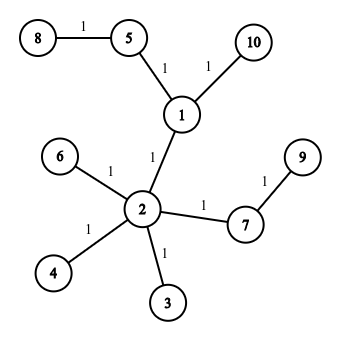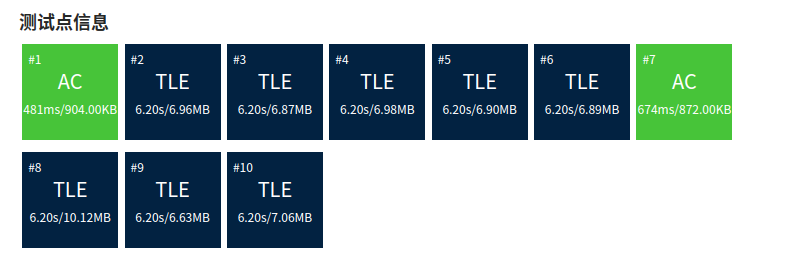先考虑无修要怎么操作。

发现在无修的情况下,我们可以用一个换根(dp)解决。
那么带修改的情况要怎么办呢?
每次修改重新(dp)一遍不就行了(雾。
好的,让我们先来敲一个(O(N^2))的(dp)。
#include <bits/stdc++.h>
using namespace std;
typedef long long ll;
inline ll ty() {
char ch = getchar(); ll x = 0, f = 1;
while (ch < '0' || ch > '9') { if (ch == '-') f = -1; ch = getchar(); }
while (ch >= '0' && ch <= '9') { x = x * 10 + ch - '0'; ch = getchar(); }
return x * f;
}
const int _ = 1e5 + 10;
const ll INF = 1e18;
int tot, head[_], to[_ << 1], nxt[_ << 1], edge[_ << 1];
void adde(int x, int y, int z) {
to[++tot] = y;
edge[tot] = z;
nxt[tot] = head[x];
head[x] = tot;
}
int N, M;
ll val[_], g[_], f[_], sum, ans;
void dfs(int x, int fa, ll d) {
f[1] += d * val[x];
g[x] = val[x];
for (int i = head[x]; i; i = nxt[i]) {
int y = to[i], z = edge[i];
if (y == fa) continue;
dfs(y, x, d + z);
g[x] += g[y];
}
}
void dp(int x, int fa) {
ans = min(ans, f[x]);
for (int i = head[x]; i; i = nxt[i]) {
int y = to[i], z = edge[i];
if (y == fa) continue;
f[y] = f[x] - g[y] * z + (sum - g[y]) * z;
dp(y, x);
}
}
void work() {
f[1] = 0, ans = INF;
dfs(1, 0, 0); //先以1为根,求出答案,然后进行换根dp
dp(1, 0);
printf("%lld
", ans);
}
int main() {
#ifndef ONLINE_JUDGE
freopen("fantasy.in", "r", stdin);
freopen("fantasy.out", "w", stdout);
#endif
N = ty(), M = ty();
for (int i = 1; i < N; ++i) {
int x = ty(), y = ty(), z = ty();
adde(x, y, z);
adde(y, x, z);
}
while (M--) {
int x = ty(), y = ty();
val[x] += y, sum += y;
work(); // 每修改一次,就重新dp一次2333
}
return 0;
}
然后就是这样的盛况:

“没事,卡卡常就过了。”@mzx
因为我太菜了,所以并没有把(O(N^2))卡常卡成(O(N log N))的能力。
先考虑一下这个(dp)的本质是什么,考虑从一个点(x)移动到点(y),那么花费值的变化亮就是
[dis_{x,y} imes (sum - 2 imes g_y)
]
所以我们发现,当(sum-2 imes g_y)为负数的时候,答案便会减小,且可以证明每次这样的点唯一,所以实际上,我们可以从(root)开始出发,每次往(sum - 2 imes g_y)为负数的那个方向走,直到走不动时,就得到了最优解。
下面是动态点分治的内容了
发现主要是每次修改后,都需要从(root)节点重新开始寻找最优解,最坏情况下还是会达到(O(N^2))的复杂度,所以考虑如何优化这个过程。此时,就应该扯上点分树了。
假设我们能利用点分树求得答案,因为在点分树上只需要访问(log)个点,所以一次修改的复杂度就降到了(log)级别。
此时,正确的做法似乎逐渐浮出了水面:
假设当前所在的节点为(x),那么我们枚举(x)在原树上的边,假设这条边的另一端为(y),然后用(O(log N))的复杂度暴力计算出如果移动到(y),花费是多少,如果花费减小,那么跳到点分树中对应的块上,然后再在对应的块里面求解,若不存在这样的边,那么肯定就是最优解。
现在思考一下这个做法需要维护哪些东西:
- 每个块的点权和(sum_x)(点分树上(O(log N))修改)
- (dist_x):(x)在点分树上对应的联通块所有的点跳到(x)的花费
- (sub_x):(x)在点分树上对应的联通块所有的点跳到(x)在点分树上的父亲(fa_x)的花费
然后查询和修改不断暴跳父亲就好了。
#include <bits/stdc++.h>
using namespace std;
inline int ty() {
char ch = getchar(); int x = 0, f = 1;
while (ch < '0' || ch > '9') { if (ch == '-') f = -1; ch = getchar(); }
while (ch >= '0' && ch <= '9') { x = x * 10 + ch - '0'; ch = getchar(); }
return x * f;
}
typedef long long ll;
const int _ = 1e5 + 10;
const int INF = 0x3f3f3f3f;
int N, M;
int tot, head[_], to[_ << 1], nxt[_ << 1], edge[_ << 1];
void adde(int x, int y, int z) {
to[++tot] = y;
edge[tot] = z;
nxt[tot] = head[x];
head[x] = tot;
}
namespace lca {
int fa[_], son[_], dep[_], dis[_], siz[_], top[_];
void dfs1(int x, int f) {
siz[x] = 1;
int maxx = 0;
for (int i = head[x]; i; i = nxt[i]) {
int y = to[i], z = edge[i];
if (y == f) continue;
fa[y] = x, dep[y] = dep[x] + 1, dis[y] = dis[x] + z;
dfs1(y, x);
siz[x] += siz[y];
if (siz[y] > maxx) maxx = siz[y], son[x] = y;
}
}
void dfs2(int x, int topf) {
top[x] = topf;
if (!son[x]) return;
dfs2(son[x], topf);
for (int i = head[x]; i; i = nxt[i]) {
int y = to[i];
if (y == fa[x] || y == son[x]) continue;
dfs2(y, y);
}
}
void init() {
dep[1] = 1, dfs1(1, 0);
dfs2(1, 1);
}
int query(int x, int y) {
while (top[x] != top[y]) {
if (dep[top[x]] < dep[top[y]]) swap(x, y);
x = fa[top[x]];
}
return dep[x] < dep[y] ? x : y;
}
int dist(int x, int y) { return dis[x] + dis[y] - 2 * dis[query(x, y)]; }
} // namespace lca
int mxsiz, totsiz, root, siz[_], vis[_], fa[_];
void getroot(int x, int f) {
siz[x] = 1;
int maxx = 0;
for (int i = head[x]; i; i = nxt[i]) {
int y = to[i];
if (vis[y] || y == f) continue;
getroot(y, x);
siz[x] += siz[y];
maxx = max(maxx, siz[y]);
}
maxx = max(maxx, totsiz - siz[x]);
if (maxx < mxsiz) mxsiz = maxx, root = x;
}
typedef pair<int, int> PII;
vector<PII> E[_];
void divide(int x) {
vis[x] = true;
int nowsiz = totsiz;
for (int i = head[x]; i; i = nxt[i]) {
int y = to[i];
if (vis[y]) continue;
mxsiz = INF, root = 0;
totsiz = siz[y] > siz[x] ? nowsiz - siz[x] : siz[y];
getroot(y, 0);
E[x].push_back(make_pair(y, root));
fa[root] = x;
divide(root);
}
}
ll sum[_]; // 点分树中以x为根的子树的权值和
ll dist[_]; // 点分树中以x为根的子树全部到x的花费
ll sub[_]; // 点分树中以x为根的子树全部到x在点分树上的父亲的花费
void modify(int x, int y) {
sum[x] += y;
for (int i = x; fa[i]; i = fa[i]) {
int len = lca::dist(x, fa[i]);
sum[fa[i]] += y;
dist[fa[i]] += 1ll * y * len;
sub[i] += 1ll * y * len;
}
}
// 用一个log的代价直接计算以x为供应站时的花费
ll calc(int x) {
ll ret = dist[x];
for (int i = x; fa[i]; i = fa[i]) {
int len = lca::dist(x, fa[i]);
ret += 1ll * len * (sum[fa[i]] - sum[i]);
ret += dist[fa[i]] - sub[i];
}
return ret;
}
ll query(int x) {
// printf("%d
", x);
ll cur = calc(x);
for (auto p : E[x]) {
int y = p.first, rt = p.second;
// printf("%d %d
", y, rt);
if (calc(y) < cur) return query(rt);
}
return cur;
}
int main() {
#ifndef ONLINE_JUDGE
freopen("fantasy.in", "r", stdin);
freopen("fantasy.out", "w", stdout);
#endif
N = ty(), M = ty();
for (int i = 1; i < N; ++i) {
int x = ty(), y = ty(), z = ty();
adde(x, y, z);
adde(y, x, z);
}
lca::init();
mxsiz = INF, totsiz = N, root = 0;
getroot(1, 0);
int RT = root;
divide(root);
while (M--) {
// printf("!%d
", M);
int x = ty(), y = ty();
modify(x, y);
printf("%lld
", query(RT));
}
return 0;
}